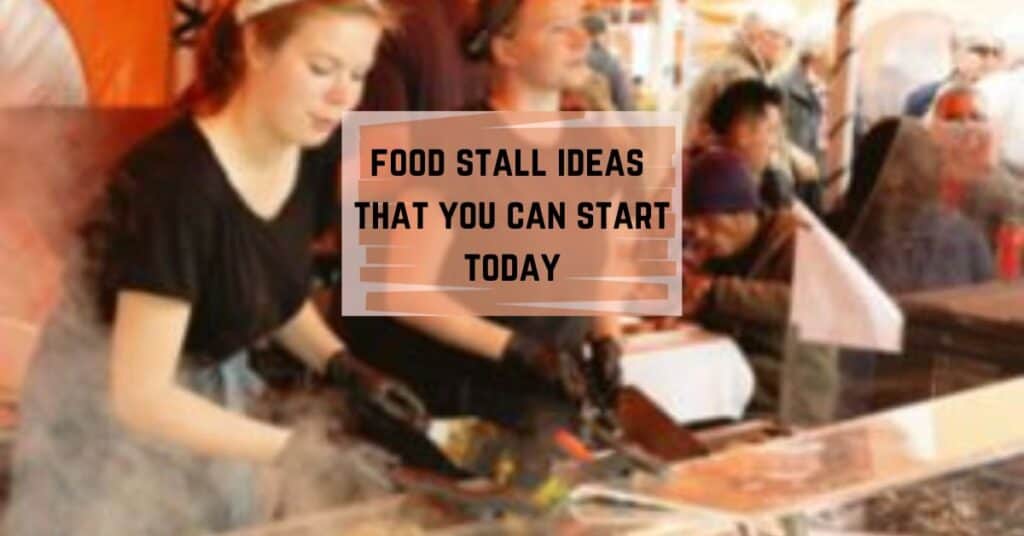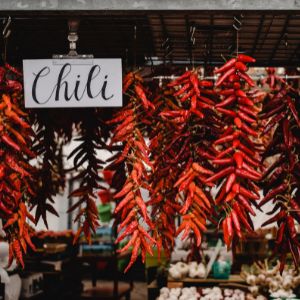
Having stood at thousands of markets and shows we have seen hundreds of food stalls come and go in our 17 years of trading. Some have gone on to become national brands and others have traded to their regular customers and fans successfully week in, week out.
Starting a food business can be as simple as choosing a food type and practising it until you become a master. Then, find a cool way to package and market your wares. Having the confidence and organisational ability to get all your stock to the market and on time is key.
Sometimes getting a product idea can be as simple as looking at a niche, like cakes, and then niching down. E.g. brownies, cheesecakes, shortbread, sponges, cupcakes, scones, meringues etc.
By finding a specific sub-niche you will become an expert in your selected area. Folk will find it easier to mentally identify your brand. E.g. “Where is the Meringue Stall?”
Bear in mind that some food items will work better at a Farmers’ Market than at a Food Festival. It may be helpful to decide which type of event you want to trade at from the get-go.
For example, if you sell homegrown mushrooms, you are likely to get more sales at a recurring Farmers’ Market. Or if you sell food to eat on the go, then you will do very well at a Food Festival.
Don’t compare what supermarkets sell and the price that they sell it for though. Folk who shop at a Farmers’ Market would much rather buy an excellent homemade preserve at double the price.
A great way to start getting ideas is to think, what would I want to buy if I was at this venue? What don’t they have that I would want? Here are a few ideas. Some are familiar and some a little less obvious and unique.
Ready Meals – served in foil and cardboard takeaway trays. These sell well at regular markets where your clientele will get to know your products. Quite often where there is a more single and affluent customer base. Things like curries, chilli, shepherd’s pies, pasta dishes, beef bourguignon, chicken chasseur, sticky toffee puddings and Chinese dishes. Many will pay for the convenience or luxury of these. Stallholders in particular when the last thing they want to do is cook after a busy market.
Cordials – usually consisting of boiled fruit and sugar. Can be great as a stand-alone product or as a complementary product. Elderflower cordial is popular in the UK and is famous for being a seasonal product taken from a seasonal bush. Elderberry-derived products in the USA are known for their health benefits. Ribena is one of the most famous elderberry brands.
Coffee Beans – here we are talking beans rather than cups. Selling beans in bags, or ground on the stall. The freshly ground aroma is very enticing, particularly if the seller has flavoured beans, like caramel, hazelnut, vanilla ad infinitum. If your product is good, a coffee stall will build up a loyal following.
Preserves – jams, marmalades, pickles. The success of a stall selling preserves will depend on your product and marketing. I have seen many jam stalls come and go. Some really successful ones have sold miniatures (even as wedding favours), or really large jars of preserves.
Honey – the popularity of local honey seems to be on the up. It is considered an essential health food where the more local it is the better. Bee pollen is also considered a health food. The honey stall is one that is a regular at markets and if you tend your own bees, all the better. Buying in wholesale honey to sell is a risky business, particularly when its origins can be questionable.
Mushrooms – growing your own mushrooms to sell can be rewarding. We used to have a regular mushroom seller who for years sold out at every market. He stopped because the special soil/compost he needed to grow had become hard to come by. Perhaps it is now available again. Research suggested because this is certainly a popular stall.
As a minimum, here are a few things you might need to purchase when you decide to start your new Market Stall Business:
For a 6ft Folding Trestle Table take a look here: 6ft Table
We love these oilcloths as they are easy to wipe clean at the end of the day: Oilcloth Tablecloth
Take a look at this gazebo, good for weekly markets and best for price: Heavy-duty 3mx3m Gazebo
A Banner, Chalk Board Signs, A-board, Blackboard, or announcement boards.
This site is a participant in the Amazon Services LLC Associates Program. We are compensated for referring traffic and business to Amazon and other companies linked to on this site. Just saying 🙂
Savoury Pastries – everybody loves a savoury pastry. From sausage rolls, filled pies, and savoury tarts to Turkish gozleme or borek, French quiche lorraine, British pork pies or Scotch eggs. If these are delicious then you will have a loyal following.
Cakes – market organisers receive more stall applications from potential cake stalls than any other food stall type. This is because cakes are fairly easy to make and you can become an expert fairly quickly. Not only is there a lot of competition for stalls but often a lot of cake stall choices on the market itself. You can have a stall selling a selection of different types of cake or you can niche down, as mentioned above. Brownie and cookie/biscuit stalls are always popular in the UK.

Cheeses – you don’t need to produce your own milk to make and sell cheese. You can buy wholesale unpasteurised milk and make your own. Cheeses are, in the main, from cows’ milk but increasingly in demand are sheep and goats’ milk cheeses too. If you have knowledge of cheeses and can become an Affineur (someone who ages cheeses and purveys them), you can buy unpasteurised cheeses wholesale and age them. This is usually considered a specialist job and affineurs often train for years, however, a good cheese stall is always popular.
Savoury Biscuits – Imagine biscuits for cheese. Water biscuits. Raincoast crackers. A perfect addition to a cheese stall. Delicious.
Sweets – From fudge to toffee, there will always be a customer to buy sweets. Liquorice, lolly pops, boiled sweets, rock and chews. All confectionery will sell. The question is if you would have one stall selling a bit of everything or if you want to niche down. We have sold only fudge for years, only changing up the flavours and have built a good living for over 17 years.
Chocolate – clearly, as one of man’s most popular food groups, chocolate is always a winner. The better your flavours the better your sales will be. If you decide to make bars or individual chocolates or your own unique take on chocolate, you are bound to do well. The downside to this is that chocolate is temperature sensitive so you may need an ambient fridge or something to protect your product from direct sun. Also, raw materials for chocolate tend to be expensive. Going down the vegan route is very niche but may pay if your version is exquisite!
Sushi – If you can source your raw materials and have the necessary skills then this could be a winner for you. But having a product with a very short shelf life will mean that you will need a good footfall to break even.
Baked Potatoes – these are more of a takeaway food but a great alternative for customers who have food intolerances. Potatoes are gluten-free, fat-free and vegan and extremely popular. A selection of additions to please every palate and you have a winning product.
Sandwiches – Freshly cut sandwiches are always nice to see on a market. Not many stalls do this but having a table full of beautifully packaged sandwiches using fresh artisan bread, perhaps packaged in greaseproof paper (rather than plastic) looks great. The downside is that you’ll have waste if you don’t sell them all but the upside is that if you make a great product, you could build a loyal following.
Curries – Curry sells well in the UK. If you can make a great curry, then you will have a regular following. From kormas to vindaloos, chaat to thali or goat to vegan. There is such a wide variety of flavours and dishes, you can bring your own personality to any curry business.
Salads – Like the curries, above, there is such a wide array of salad dishes that you can create. You can make any salad business very unique. The downside is the longevity of the product, but at a busy market or event, you should sell out with a good footfall.
Wraps – takeaway food served in wraps is easy for your customer to consume on the go. Whether it is falafel or gyros or wrapped salads, this type of food is the new ‘black’! Supply a good quantity of napkins for catching dripping sauces and you’ll do well.
Soup – selling soup is fine in winter but in summer sales are not so good. If you secure a pitch, you may want to change it up in summer, to fruit smoothies as a friend had successfully done.
Speciality Foods: GF, Paleo, Keto, WFPB, Vegan, Vegetarian. Some speciality stalls do well though you are cutting off a certain amount of the available audience by niching down. A speciality stall will work if you have a good footfall, especially if you can make your particular audience aware of your presence. As more people develop allergies they will have special dietary needs, so if you pick your niche well and can advertise your stall, you could do well.
Pasta – fresh or dried pasta works well at a market. If customers can see you making it at a stall, you will do well. Also, offer alternative pasta ingredients rather than the usual wheat pasta. Some could be chickpea, spelt, lentil or beetroot pasta. Consider selling pasta sauces to compliment the main event.
Chillis – stalls selling chillis are not very usual in the UK. The benefit of such a stall is that your stall can be very colourful. From displaying the fresh fruit to hanging dried chains of chillis to dried herbs and jars of chilli infusions, the scope for variety is huge. I have worked on a chilli stall at one time and I noticed that chilli lovers are very passionate about their chilli. Be sure you know your stuff because chilli lovers will spot a fake a mile off!

Herbs – culinary herbs sell very well. You may find that this is a seasonal business but if you have greenhouses and the necessary space and climate, I have seen these sold year-round. A side business to this is also to sell your goods online. You can also sell frozen herbs and dried herbs.
Nut Butters – these are becoming more of a household staple rather than the luxury they once were. Peanut butter is the forerunner to the more trendy almond, cashew, hazelnut and seed butters. Flavoured nut butters are also great, with delicious flavourings like cacao, orange and raspberry. These work well online too.
Muesli – With a base of oats, a stall selling different kinds of breakfast muesli does well. Change it up by using different granola recipes too and you could have a great business. Selling fresh milk and yoghurt compliments this product well.
Tea – A tea stall can incorporate all of your favourite blends, including fruit and flower teas, green teas, rooibos and herb teas. The list is endless. You can also sell tea glasses, teapots and strainers on the stall as peripheral items. Lovely addition to any busy market.

Whatever type of food that you choose to sell, remember to get the green light from your local environmental health office. Your audience will determine how well your products sell at any given market. Some items will sell better at upmarket venues where you might have a more health-conscious customer and others may do better where the customer is more foodie oriented. Research and testing are key.
Happy Trading!
